So yeah, the year's been over for a couple months. The wrinkle of aiming quality films at January/February runs (though released in single theaters on December 31st, only in NY and LA, to qualify for Oscar) means that it isn't even possible for me to make a list until it's "too late." I guess internet piracy hasn't yet done for film criticism what it's done for music criticism. (Although to be fair, music criticism has been Amateur Night for a long, long time.)
Anyway, what also happened is the absolute bumper crop of excellent movies. The list of capital-F Films from 2007 would look far more impressive than last year's list. There will be no repeat of last year's Martin Scorcese Oscar make-up call, awarded to the pulpy, capital-M Movie The Departed. I've spent the last month pounding the local theaters, and I still think I missed an awful lot. The upper echelon was just too good.
As were all the other echelons, for that matter. From Gone Baby Gone to Superbad to Michael Clayton to Shoot 'Em Up, a lot of movies that could have been dismissed for one reason or another turned out to be not just successful but triumphantly so. Even crap like 300, Transformers (begrudgingly), and Live Free Or Die Hard were better than they had to be. Summer blockbusters (namely each of the "threequels" besides Bourne) were the only bunch that got its ass kicked in the quality department.
Apart from quality, the other common thread I've noticed is controversial endings. Walk through the top ten (the top twenty, really) and you'll find a lot of movies with difficult, puzzling, anticlimactic, and above all else hotly-contested endings. On the flip side, walk through the sections of so-so movies and you'll find a lot of so-so endings. You're more likely to stick by a memorable head-scratcher (the #1 entry on the list being Exhibit A) than a tepid ending you've seen before, no matter how well it was executed. It's damn near impossible to come up with a great, unique ending; it's yet another testament to the filmmakers in question that so many of them did so.
Since I can't convey the kick-ass-ness of my list without discussing a few surprises, consider yourself mild-spoiler-warned. I will also mark any paragraph with HIDEOUSLY-COLORED TEXT if anything truly revelatory is coming along, and show you some MORE SOOTHING when I'm done.
MOVIES I MISSED, VAGUELY IN THE ORDER OF LIKELIHOOD OF AFFECTING THIS LIST
Persepolis
Atonement
Rescue Dawn
American Gangster
Charlie Wilson's War
The Darjeeling Limited
Before The Devil Knows You're Dead
Southland Tales (I didn't say how the list would be affected)
MOVIES GOOD ENOUGH TO MERIT A SHOUT-OUT
Breach
The Bourne Ultimatum
Hairspray
Harry Potter And The Whatever It Was This Time
Heima
Hot Rod
The Lookout
Ocean's Thirteen
The Simpsons Movie
WORST MOVIE OF THE YEAR
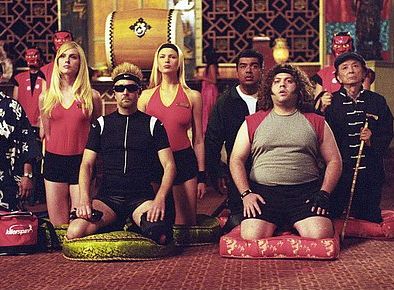
Balls of Fury
No matter how stupid a movie is, it must take its own structure seriously, and handle itself consistently in that regard from start to finish. Not negotiable. Dodgeball had a coherent story to tell. Nihilistic spoofs like Airplane and Blazing Saddles respect their own structures.
Not so with Balls of Fury, which has an obvious surface-level contempt for its own storytelling... a contempt that I share. This stupid, insipid mess wastes only two or three decent laughs on an absolutely embarrassing finished product. A funny movie can forgive errors in craftsmanship, which in this case number in the thousands after the twenty-five minute mark. But with so many jokes falling flat, there's no saving this turkey.
Why am I so livid about a movie that clearly isn't worth the time I've spent on it? BECAUSE IT COULD HAVE WORKED! They achieved a very difficult thing: they proved that you can assemble a decent movie premise about ping-pong. I watched the trailer and laughed my ass off! But they screwed it all up, worse than anyone could have imagined.
Hey, at least George Lopez got a paycheck.
MEDIOCRE FILMS THAT SHOULD HAVE BEEN BETTER
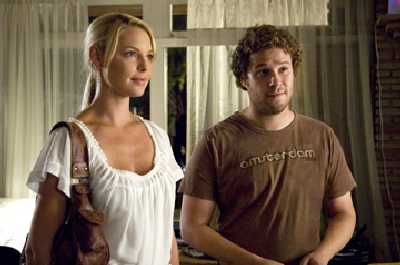
Knocked Up
For reasons mentioned ad nauseum elsewhere. At least my opinion appears to be how the film will be remembered: funny, with reservations. There was talk of a screenplay Oscar nomination... thank GOD they didn't do that. Oscar has been tainted enough in recent years. It's a hilarious movie, but let's stop sucking each others' dicks for a minute and ask ourselves WHAT THE FUCK THOSE TWO PEOPLE ARE DOING IN THE SAME PICTURE!!!!!
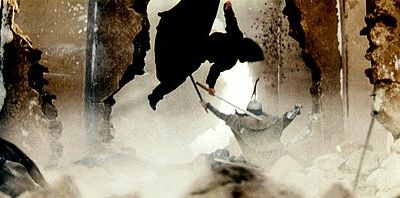
Day Watch
The follow-up to 2005's sublime Night Watch is decent, but a major disappointment. The first was indulgent and kinetic; this is just indulgent. It throws all sorts of gimmicks at us that violate the guidelines and spirit of its predecessor in its attempt to outdo said predecessor. Except it doesn't outdo Night Watch's genius as much as undo it.
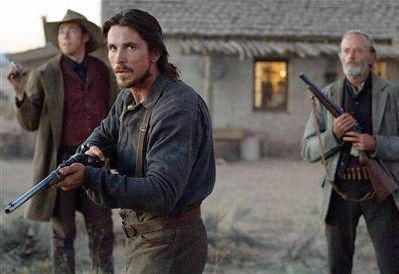
3:10 To Yuma
I'm not as vitriolic in my hatred of the ending as some. Westerns are, first and foremost, morality plays. The ridiculous-ass climax of this otherwise excellent movie fits in nicely with that. Within the context of the genre, I'm OK with the climax.
My objection is to everything that transpires leading up to said climax. The adapters wrote themselves into a corner, and their escape from the hole just doesn't ring true. You can't have a conclusion like that without telegraphing it, in no uncertain terms. There's a little half-assed foreshadowing, but not enough to keep me from going "whaaaaaaaaAAAT?"
The filmmakers also switched back and forth from "Ben Wade is evil and principled" to "Ben Wade is entirely evil and selfish" pretty randomly, basically making him one or the other when it suited their expositional needs. You really don't know what the hell is motivating Wade to not just run off at every point. Maybe that's the fault of Russell Crowe, maybe it's James Mangold. I don't know. But I know it's an inconsistent portrait, one way or another, even if it's gripping as hell.
It's a real shame that the third act was so casual, because the conception was otherwise excellent. The acting, photography and set design were all top-notch. Yuma's world is harder, gritter, more dark and hateful than we're used to seeing in westerns, even in the post-Unforgiven universe. And the extent to which the climax comes out of nowhere is really frustrating.
(Note: here's where the year's depth of quality really becomes evident. The next ten movies are an absolute murderer's row of must-see movies... but CLEARLY are not up to snuff. Which is amazing, because I'd have no problems voting for any of them on any previous year's list. Shit, my #10 last year was The Devil Wears Prada... good movie, but I'll take any of these over that.)
BEST FAILURE
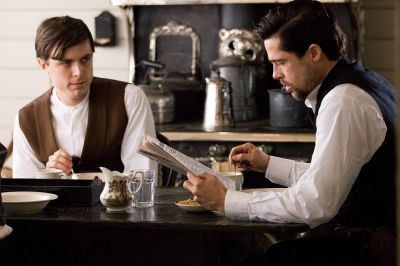
The Assassination of Jesse James by the Coward Robert Ford
This is an awfully well-made movie, as good as they come in a lot of respects. But also a deeply flawed one. If the title alone makes you impatient, just you wait.
Good news first. The acting is superb. The music by Nick Cave and Warren Ellis is as good as it gets, up there with Jonny Greenwood's work on There Will Be Blood as the best of the year. The Oscar-nominated photography by frequent Coen Brothers collaborator Roger Deakins is outstanding, and by far the best thing about this film. The pacing and the minor-key mood suit the story nicely.
It reminds me (and rightly so, apparently) of Terence Malick's The New World in that it demystifies what we expect to see from a story in its period. When I think of colonial times, I don't first imagine the unbelievably lush wilderness of The New World... I think of Plimoth Plantation, red-coats, Benjamin Franklin, Thanksgiving, that sort of thing. And yet the lush Virginia swamps are probably more true to life. Likewise, watching Assassination, you get the feeling that they've created a more faithful vision of the 1880s than most Westerns would have. Andrew Dominik was explicitly going for Malick while making this film, and it would seem that he achieved it.
Except for one thing: the lack of purpose behind its languorous, Malickian pace. There's no reason for dragging things out to this length besides to assert that you can. It's epic for the sake of being epic. It's a well-meaning attempt at the kind of fanciful poetry that Malick can draw from so little. But it falls short.
More importantly, the tale hinges on things that the audience can't really accept. One of the guiding principles of the story is that Jesse James, legend, is absolutely as godlike and special as he's made out to be... and Bob Ford is absolutely not. Ford, in fact, is shown to fail at each of his attempts at ingratiation. And yet there he is, tagging along all the way through to the end. Given that Jesse James is severely untrusting and paranoid, that he has no qualms about disposing of those he sees as traitorous, and that there's nothing (whatsoever) likable about Bob Ford, what exactly does Jesse James see in him? We never find out.
I guess Dominik expects us to just take it as fact. Sure, the story as it unfolds is kinda-sorta-basically true is irrelevant. And life isn't always logical, and this is kinda-sorta what really happened. Sure. But that doesn't matter when it isn't demonstrated. True or not, it must be shown. The film's title alone is not reason enough to accept its contents.
The bottom line: the two most critically important moments in a story are the provocation, which sets the story's action in motion, and the climax, which halts it. Here, the provocation (Jesse's acceptance of Bob) and the climax (the film's title) are the two most unconvincing moments in the entire movie. That, my friends, is a problem.
Malick can certainly be proud that Dominik is following his lead. But I'd like to see what Dominik does when his aesthetic doesn't dilute his message.
Runners Up
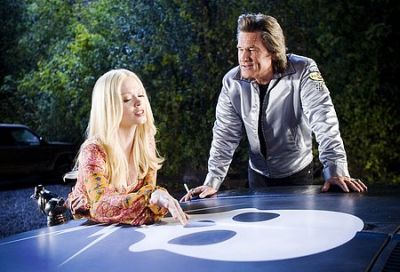
Grindhouse
Fun for the whole family.* I eagerly await the arrivals of Machete, Don't, and of course Thanksgiving, the film that could either redeem Eli Roth as a human being or seal his fate. Especially if he fleshes out (so to speak) the trampoline scene.
* if your whole family is 18-to-35-year-old males
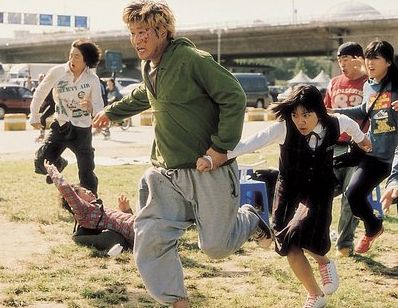
The Host
Allegorical and ultimately poignant monster movie from Korea. The take-home message of constant vigilance is hard to miss.
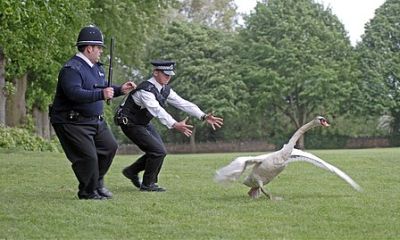
Hot Fuzz
As someone whose entire life was affected, for the better, by spoofs like Blazing Saddles, Airplane!, Hot Shots!, and The Naked Gun, it's infuriating that uncreative, lazy, stupid, and above all else unfunny hogshit like Epic Movie is allowed to exist. It is the worst kind of hackery.
Movie spoofs, like any satirical art, are meant to work not just as parodies but also as the thing that they parodize. And comedy is one of the many things that should not be attempted if you have no intention of making it work.
So it's nice to know that the Pegg/Frost/Winter team behind Shaun of the Dead and Hot Fuzz are out there, fighting the good fight and actually knowing what they're doing. Fuzz does what it's supposed to do: it sends up action movies (with major insight), it works as an action movie, and it's flat-out hilarious.
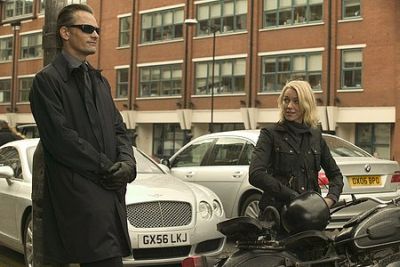
Eastern Promises
Intelligent, lingering thriller about the Russian mafia. I personally find David Cronenberg's unnaturally slow delivery of dialogue to be a distraction. However, the slow, get-on-with-it pacing of this story builds all kinds of suspense. That, and Viggo Mortensen kicks all kinds of fucking ass.
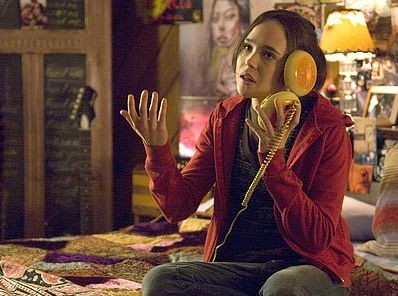
Juno
There are so many things I like, and so many more that I really despise.
Much has been said about the script and the dialogue, but Diablo Cody's cleverness doesn't always suit the material. (I sound like all my old English teachers.) The great stuff is great, but even in a fantasy universe like this, lines like "silencio, old man" that might have seemed clever in print just slam into the ground and die. The first ten minutes is chock full of lines just like that... spoken in an attempt to impress a style upon us, but it doesn't quite fit. All it really does is take us off the rails. Given that the first scene of the movie is so amazingly tender and sweet, why are we then subjected to that barrage of "honest to blog" crapola? It undermines so many great things.
That said, Juno finds its legs once the story gets rolling, and once we have something other than Witty Banter to hold onto. At that point, it takes off into space. We start seeing things other than bravado from Juno. Her vocabulary becomes a defense mechanism more than a lovable trait. As many things as are wrong with it, they managed to capture something really magical and adorable that forgives it.
(Not the music though. Juno herself may be a little too cute and clever, but we eventually warm to her once we see that she's way more full of shit than she sounds. Not so much with the written-on-a-bar-napkin music. Its preciousness reflects and multiplies the preciousness of the movie... and that's a bad thing.)
I also wanted to mention Jennifer Garner here, since by the end she's the one holding the movie together. As the grown-up killjoy, she has the toughest job in the movie, and she manages to be both hardened (for a reason) and ultimately sympathetic. Anyone who can make a Vitamin Water-drinking yuppie bitch likable has done a hell of a job. Outstanding.
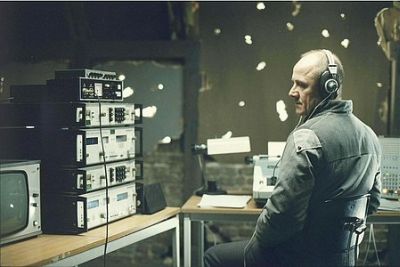
The Lives Of Others
Far from the depressing, in-your-face moralism that you'd suspect, this is a taut character study of a cog in the East German bureaucratic machine who begins to let the subjects of his surveillance campaign get the better of him. Last year's foreign language Oscar winner, and deservedly so.

Once
This very, very good movie irritated me in a lot of ways once (ha) it was over, primarily because the story structure is so haphazard. Not the film itself; obviously it is a guerrilla film, and will therefore have rough edges. In keeping with my theme, I am bothered tremendously by the ending.
An ending has to reinforce everything that preceded it, either by confirming what we suspected or inverting those suspicions and revealing the true nature of the story. Once's climax does neither. It plays against the grain with our suspicions and our understanding of the characters, and sends a message neither consistent with the themes of the film nor consistent with our knowledge of the characters and their respective love lives. The last note is cute, but no matter how cute it is, you still have to set it up. It felt too much like a left turn, and not enough like the "awwwww" that a movie like this needs in order to be a home run.
I certainly don't begrudge anyone who feels differently. Flawed or not, it's a terribly romantic and stirring movie. You'd have to be a real curmudgeon to be unmoved by the heartfelt and believable performances of both Glen Hansard and Markéta Irglová. And for an el-cheapo hand-held guerilla film, it's fantastic. But in the final analysis, it just doesn't feel right. It feels half-baked and thrown together instead of conceived. It's the little movie that almost did.
BIGGEST SURPRISE
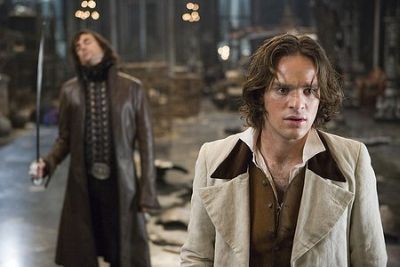
Stardust
What a great, great movie. Funny, lovable, creative, and exciting, but never perilous or black. While every other fantasy movie is taking pages from The Lord of the Rings, this one rips off fantasy movies from the 80's: Labyrinth, The Neverending Story, Ladyhawke, that sort of thing.
MOST ADMIRABLE GENRE FILM
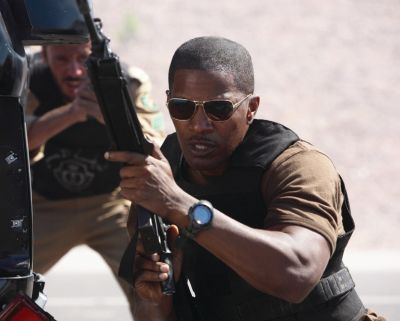
The Kingdom
I love when a genre movie aims higher than it needs to, and succeeds. The set pieces, as fresh and original as you can get, are exactly as terrifying as you would expect them to be in real life. But it isn't just a typical political actioner. It actually has something more insightful and resonant to say than "America: FUCK YEAHHHHH!"
On the surface, it's a "catch the Arabs, blow stuff up, try not to be too racist" thriller. There have been plenty of those, each demonstrating that peppering a basic "we're the good guys" military operation with some "yeah, but..." thoughts doesn't really work unless the action itself fits into all the philosophizing.
But just when you think The Kingdom is going to fit that description to a tee, right at the very end, the closing line drops, flipping the film's entire morality structure inside out. The exhilaration of success comes with a sobering take-home message. It may lack the reassuring humanism of Three Kings, but it hits a lot harder.
Meanwhile, back at the ranch...
BEST GUILTY PLEASURE
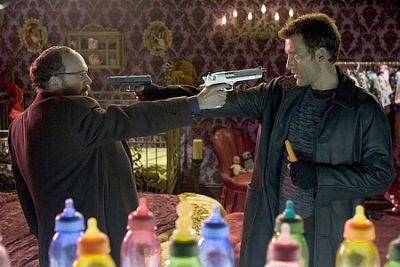
Shoot 'Em Up
Oh boy. Bugs Bunny as hard-boiled action hero... and as you can see, he's even got the carrot. Admittedly, you have to be in the right mood for a movie like this. It's too surreal and over-the-top to be believable; the silliness takes away any shot at an emotional punch; its underlying plot is rendered pointless at every possible moment. But I don't care whether it's a Complete Moving Picture Experience. Every time you think they won't top what you just saw, they do. It's exactly what overtly over-the-top movies have to be: ingenious.
THE LIST

10. Zodiac
Don't expect a cop movie. When you realize how David Fincher decided to attack this story, the police procedural about an unsolved crime, it will all make perfect sense. Much like No Country For Old Men, this is a film about futile obsession, about knowing when to fold, first, second and third. There's this Zodiac killer guy or something too, but he's beside the point.
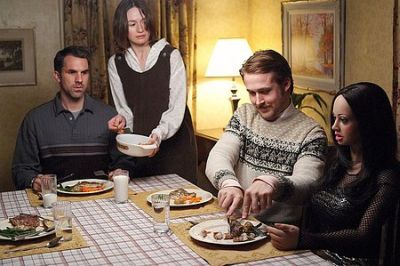
9. Lars and the Real Girl
What a pleasant surprise. You think "lonely guy with no social skills buys a sex doll," and you'd think it'd be a dumb gross-out comedy, or at the very least unseemly. But it plays out as a big, wholesome joke on those of us with our minds in the gutter. How unexpected it was when the lights come up and you realize how utterly wholesome and sexless it was.
To say nothing of optimistic; it's one of the more sweetly positive movies you'll ever see. Much has been made of the recent trend towards antagonist-free comedies (Judd Apatow productions like The 40-Year Old Virgin), and Lars does them all one better by showing a world absent of conflict. Everyone cares SO much about Lars, and wants SO badly for him to grow up and be happy, that they cast themselves, and their entire worlds, into an absolutely ridiculous proposition... for Lars' benefit, and for no other reason.
I'm not all that excited about Ryan Gosling's endearing but unnatural portrayal. I was more impressed by Paul Schneider as Lars' brother, a refreshing inversion of the typical resistant, wet-blanket character. Even when he fights Lars' "relationship," he does so with only the best of intentions. Despite being the lone voice of reason, he gives in to insanity rather than act the killjoy. And as goofy shit just explodes all around him, he slowly suspends his disbelief. As do we. Well done.
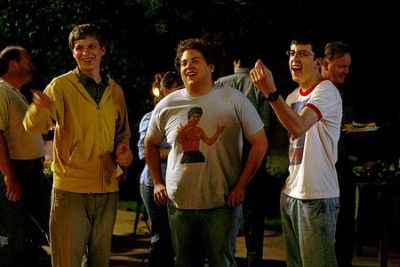
8. Superbad
A perfect, joyous, sophisticated film about cartoon dicks. [NSFW]
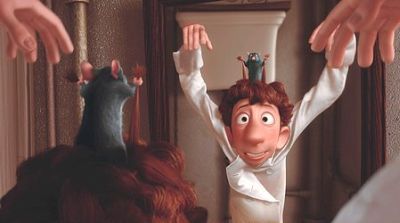
7. Ratatouille
A perfect, joyous, sophisticated film about cartoon rats.
I really can't recommend this enough. It's not for kids in any way. Strictly for adults... and sophisticated adults at that.
(Again, for those keeping score, this is the point at which every movie from here on down is better than The Departed, a.k.a. The De Facto.)
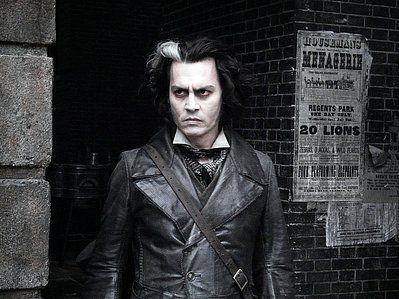
6. Sweeney Todd
The first GREAT movie musical I've seen since the revival of the genre. Others have been uneven at best (Dreamgirls, Chicago), atrocious at worst (Rent, The Producers), and a little too Broadway for my liking in the middle (Hairspray... good movie, but ceeee-hrist). You have gonzo stuff like Moulin Rouge! and cartoons and stuff, or a satire like South Park, but the actual serious Broadway adaptations haven't really work across the board.
And Sweeney does. Everything seems just right. You never feel like you're watching a Mu-si-cal Num-be-e-e-e-e-er!!! The songs always plays as the story, not the song alone. Not that the music and conception aren't fantastic; they just serve their purpose first and wow us second.
But still, in typical Tim Burton fashion, it kinda fizzles (gurgles?) at the end. The revelations of the finale don't shake you or move you as they should... possibly because the devastation is drowned in explosive geysers of blood. And even though Johnny Depp is the only actor alive who could have pulled off that role, he nevertheless missed an opportunity to knock the conclusion out of the park, Daniel Day-Lewis-style. ("I... eat... your... MEATPIES!")
Still, that's nit-picking. Totally awesome.
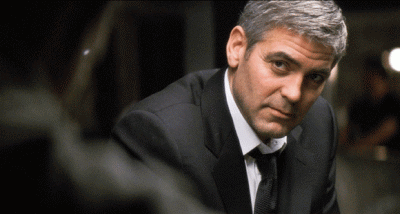
5. Michael Clayton
A master's class in genre writing. Tony Gilroy breathes life into a tired, washed-up legal drama plot (corporation poisons the poor, oh noes!) by ignoring the victims and concentrating solely on the moral quandaries encountered by the lawyers in each level of the case: the head of the firm; the lead defense attorney; the defendants' private legal counsel; and the "janitor," Clayton. The acting, of course, is excellent. George Clooney is the rock, but Tom Wilkinson and Tilda Swinton are perfect and thorough in their portrayals.
*** SPOILER ***
But again, it's all about the ending. What's nice about it is that it doesn't trumpet Clayton's decisive action as a win or a loss. There are tastes of common redemption themes (revenge, morality, loyalty to one's mentor, denying a sell-out opportunity, etc.) that come into play, but none of them dominate. Clayton had simply had enough. "Fuck you" that the conclusive act was, it was less a "fuck you" than a truly grand "I quit." A resignation, as opposed to a victory. Legal dramas aren't supposed to end ambiguously... but the taxi ride, devoid of reaction, says it all. No judgment, no celebration, no concern... it's just something that I did today.
*** END SPOILER ***
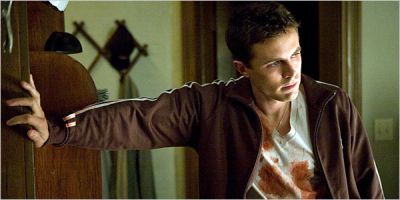
4. Gone Baby Gone
Mystic River, eat Ben Affleck's shit. He and Casey deserve TONS of credit not just for executing Dennis Lehane's source material so well, but also for bringing so much extra to it. A gritty potboiler mystery with, ahem, one of the great endings you'll ever see... an absolute head-scratcher that not only inverts everything you thought you knew about the story's key participants, but leaves you legitimately speechless as to what you would have done. And gosh, did they nail the neighborhoods. Bravo.
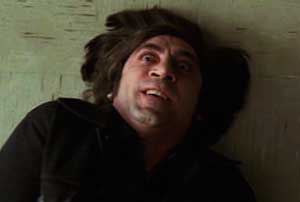
3. No Country For Old Men
A bleak, dark, and violent fable about the nature of evil. But unlike most morality plays, it's not about choosing sides. The unavoidable nature of death (Chigurh as reaper), the unstoppable nature of evil (Chigurh as epitome), and the complicity with which the average person enables evil to thrive (Chigurh as, um, houseplant) are all covered, but No Country is primarily about where we draw the line in fighting against the things we can't control. The train isn't stopping... so where do we get off?
*** SPOILER ***
There's been controversy over the ending (or, for that matter, what the ending actually was) but the anti-climactic, minor-key decompression was just about perfect, mirroring Tommy Lee Jones' throwing in of the towel. Evil, death, crime, greed, etc. are inexorable. They never stop. But your participation, your decision to be involved, does. The conclusion is merely where you choose to exit. Tommy Lee Jones has very little screen time, but effectively acts as our conduit; he says, this is my stop, time to head home, and that's where the telling of the story ends... or, at least, where our part ends.
*** END SPOILER ***
Anyway, it's a great film. Probably the Coens' best ever, if not their most ingenious. Flannery O'Connor would be proud.

2. The Diving Bell And The Butterfly
Wow. It's impossible to do justice to how good this is. The main casualty of this year's bumper crop of Oscar-worthy films. I'm glad that Julian Schnabel nabbed a Best Director nod, but the film itself deserves to be acknowledged for the masterpiece it is.
I had to spend a lot of time reflecting on the climax, which at first didn't work for me. But I maintain my objections. It fails in the slightest, simplest way, but for me it's important.
On the one hand, my reaction of "wait, that was IT?!?" is a testament to how engrossing the previous two hours had been. And once I got the narrative pattern down, I saw that the story made a great deal of sense. It's the tale of a man who learns to confront and accept his fate rather than fixating on what he's lost. And the suddenness of it all mirrors life itself, and whatnot.
On the other... it's not really a climax if you don't realize it until later, is it?
*** SPOILER ***
Watching Jean-Do suffer his stroke, knowing full well that he'd been unable (or unwilling) to remember the event for the length of the flim, was no doubt a significant moment. And in retrospect, yes, it makes sense that recollection would be the moment in which he fully comes to terms with what his life is. But then it's BOOM, dead, credits. What the fuck? This isn't a Hitchcock movie. Where'd that come from?!?
That problem stems from my impression that the pneuomnia wasn't obviously going to kill him. Bauby himself sets his pneumonia against his singing/grunting progress... as if to say, "as soon as you take a step forward, you take a step backward." It was NOT made out to be "just when I turned the corner, I get a fatal disease. Oh well. Release the doves!" If you DO assume it's fatal, the rest of it makes sense. But I had to retrace my steps all afternoon to connect the dots and figure out why the hell it all made sense.
Perhaps I'm being too hard. Maybe the jolting ending says something about life, and that was Schnabel's point. I suppose that part of the message of Diving Bell is that life can indeed be whisked away suddenly, just like that. I suppose it's nice that our notification of Jean-Do's death was the lack of movement in his eye... as if to say "yes, there was indeed an indication life despite it coming just from that one eye." I suppose that for a film that purports to tell the story of a life, such an underwhelming and undramatic death is fair game.
But it's not the note I wanted to hold onto as I walked home. I wasn't ready to go, and the film didn't prepare me for my departure. Maybe that says something about life! (You can't play that game forever. Which says something about life!) The bottom line is that "what a perfect ending... gosh, I'm just so floored by meaning and philosophy right now" is not how I left the theater. I left grumbling like I'd been kicked out.
Of course, it could also just be that I missed something by watching the film using only my left eye.
*** END SPOILER ***
I guess I'm still not totally decided, am I?
At least there's one thing I can say with certainty: if Janusz Kaminski isn't given the Oscar for cinematography, it will go down as one of the biggest jokes in the Oscars' already laughable history. No DP has EVER deserved an Oscar as much as Kaminski does here. The creativity behind this film's conception is astonishing. Only a master could use the kind of attention-drawing camera flourishes on which the first-person storytelling is built without coming off as a style-before-substance hack. The style never draws our attention without having a very good reason. And even then, what starts out as look-at-me camerawork soon folds into Bauby's vision of the world. Great stuff.
(Another fun thing: the washed-out, shaky-cam stuff at the beginning is eerily reminiscent of Kaminski's work during the Omaha Beach scene in Saving Private Ryan. There is a sense of order to the shaking that both scenes seem to have, though obviously to different effects.)
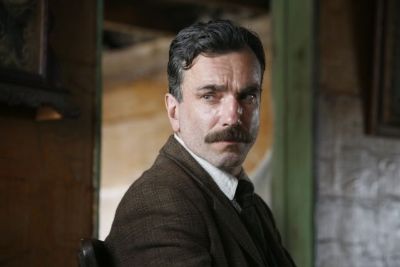
1. There Will Be Blood
This was a tough decision, made tougher by finally seeing Diving Bell.
Blood is hardly perfect. Sitting in the theater, watching its second half unfold, I was torn. No movie this year is more memorable, and no actor is more mesmerizing than Daniel-Day Lewis, despite his liberal theft of John Huston. (Watch Chinatown and tell me that's not the older Plainview.) And no film, with the exception of Diving Bell, is as fertile with insight and hidden ideas.
The divergence of opinion seems to hinge on whether you've stuck with Anderson after Plainview's rails come off. The story's focus shifts from being a grand American epic to a value-based character study, which seems to throw people off... but it's a reflection of Plainview's focus, which also shifts. As the Standard Oil executives point out to him, he's set for life... now what? But as Plainview unsettles us with his reaction, so is he unsettled by the question itself; our confusion and sense of loss mirrors his. He then spends the remainder of the film flailing around
The shift's mild clumsiness doesn't work as universally as it would need to for Blood to vault into the pantheon of great American films. A timeless film in general will not require you to sit there and think about it in order for you to get why it, in fact, makes sense. In this case, the story Blood resembles most is Citizen Kane, which tells its tale very clearly. With that story in mind, even though Blood has so many things in its favor, we're left wondering what P.T. Anderson is on about.
And yet that's just it. Look how high Anderson has raised the bar! We're talking about the difference between "great but difficult" and "all-time classic." Blood may not be as great as Kane, but its failures sure aren't due to missteps. There are even a few ways in which Blood and Plainview (blasphemy!) compare favorably to their counterparts in Kane. (Plainview's rise, for example, is more hard-earned, relatable, and quintessentially American than Kane's, which was basically inherited.) Blood is nowhere near the filmmakers' bible that Kane is, but the fact that it can stand up to the comparison at all is heavy praise.
And then there's the drainage, the milkshakes, and what's now the second-most famous slurp (behind this) in Oscar history. Anderson gets bonus credit for making his terribly serious work so damned iconic and hilarious at the same time.
In summation, Anderson has taken on the gods of cinema, and lives to tell the tale. That's enough for me.
No comments:
Post a Comment